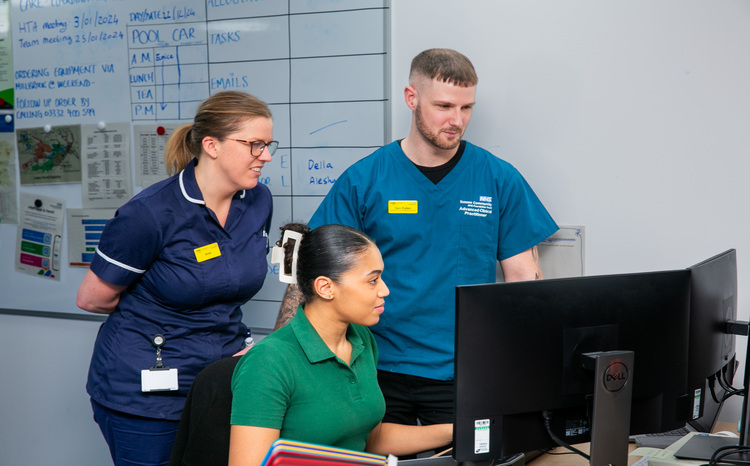Our ‘Digital Innovation Lab’ has become a critical driver of change
- 21 November 2024

The establishment of a ‘Digital Innovation Lab’ at Sussex Community NHS Foundation Trust has given staff space to experiment and see what works, writes Antonia Brown, chief nursing information officer (CNIO) at the trust.
With the NHS continuing to focus on mounting pressures on services, the question isn’t whether digital transformation is necessary, but how we can ensure it happens effectively and equitably.
Is technology alone the answer? Or does the real solution lie in empowering the people who will use it?
At Sussex Community Foundation Trust (SCFT), innovation drives our approach to transformation, with the Digital Innovation Lab at the heart of this vision. Aspiring to equip our staff with the skills, confidence and support to reimagine healthcare delivery through innovation, the lab has evolved into a critical driver of change within our trust and beyond.
It is not just a space for new ideas, but a fundamental part of how we strive to improve outcomes for patients and staff alike.
Simple yet transformative
The Digital Innovation Lab was conceived in 2022 in response to a growing recognition that traditional models of healthcare delivery were becoming insufficient to meet the increasingly complex demands on our services.
It was a simple yet transformative idea: create a virtual space where clinicians, patients, technologists, and other stakeholders could collaborate to generate, test, and scale innovative solutions that improve patient care and operational efficiency.
The lab’s origins can be traced back to our leadership’s commitment to being a digital leader as one of our five strategic goals. It was fundamentally important that our board bought in to this aspiration, because by its nature sometimes innovation fails. We needed space to experiment and see what worked for us in a large community trust.
What began as a small initiative has grown into a multifaceted operation. The lab now runs multiple projects aimed at addressing diverse challenges, from virtual consultations and use of apps to promote patient self-care and waiting well, to remote monitoring and electronic patient record innovations.
There is a well-established digital leadership programme which forms a core part of the innovation lab, as well as an online discussion network, bite-size learning, and an ambassador programme.
The lab welcomes people NHS staff from neighbouring organisations, which allows better inter-organisational working and collective thought on shared challenges.
An important part of the development of the innovation lab has been a digital clinical governance framework which ensures that we keep our work safe and aligned with the governance of the wider organisation.
One of the key areas of growth has been in leveraging technology to provide more accessible and equitable care. A flagship project of the lab is the introduction and increasing uptake of virtual consultations. This started as a necessity during the pandemic but will become a sustainable and scalable model of care delivery if we are able to leverage it.
Virtual consultations allow patients in remote areas to connect with clinicians without the need to travel, reducing waiting times and improving access. The innovation lab team are working with operational and frontline staff to lead this significant culture change project.
Focus on co-creation
What makes the Digital Innovation Lab at SCFT unique is its focus on co-creation. It’s not just about generating ideas in isolation but working collaboratively with stakeholders.
Clinicians, patients, technology specialists, and operational staff come together to understand challenges and find solutions. This ensures that the innovations we bring to life are practical, scalable, and meet real-world needs.
An important enabler of this is our user-centred design team, who work with the innovation lab to ensure user centred methodology is used, and that the voice of users of digital systems is heard. By engaging the people who will use these digital tools daily, we ensure that our innovations are safe, effective, and tailored to the needs of our staff and patients.
Our goal is not simply to innovate for innovation’s sake but to develop meaningful improvements that translate into better care, increased efficiency, and a more empowered workforce.
The growth of the innovation lab has been about more than just technological progress. It represents a shift in how SCFT approaches problem-solving and service delivery.
Innovation is now embedded in our culture. It is part of how we think and operate and is closely aligned with quality improvement. As a trust, we are not only more responsive to the needs of our patients but also more proactive in addressing future challenges.
Data-driven innovation
Looking ahead, the Digital Innovation Lab is well-positioned to continue driving change. Our focus will remain on scaling successful projects, exploring new digital health frontiers, and enhancing collaboration both within the trust and with external partners.
One of our next big steps will involve data-driven innovation, focusing on harnessing demographic data to address disparities in care. By better understanding the data, we can tailor interventions more effectively to ensure equitable access to services.
The Digital Innovation Lab has grown from a budding idea into a cornerstone of our approach to improvement. It is a place where creativity meets collaboration, and where the future of healthcare is being shaped today.
For us, the innovation lab represents not only the growth of new projects but a cultural shift in how we approach the challenges of healthcare. As we look to the future, the lab will remain a central hub for progress, driving forward our vision of delivering outstanding care for all.
Innovation and collaboration are not nice to have, optional and only possible when we’re in times of plenty. They are fundamental, and we will not see digital transformation without them.






